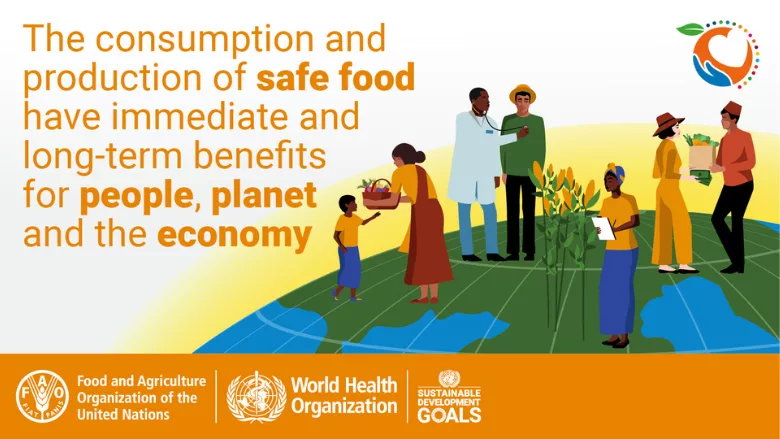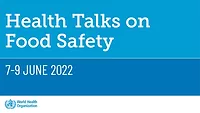World Food Safety Day 2022: Safer Food, Better Health

Credit: Food and Agriculture Organization of the United Nations/World Health Organization
“Safer food, better health” is the theme of this year’s World Food Safety Day, which takes place on June 7, 2022. World Food Safety Day is an annual effort to bring global awareness to the importance of food safety and inspire action to help prevent, detect, and manage foodborne risks. The Food and Agriculture Organization of the United Nations (FAO) expresses the urgency of ensuring safe food, reporting that foodborne illness is responsible for 42,000 preventable deaths yearly.
World Food Safety Day was established on December 20, 2018 by the United Nations General Assembly. Recognition of World Food Safety Day is the result of the efforts of FAO, the Codex Alimentarius Commission, and the government of Costa Rica. This year marks the fourth celebration of World Food Safety Day.
According to FAO’s “A Guide to World Food Safety Day 2022,” one in ten (600 million) people fall ill from more than 200 diseases that are caused by contaminated food every year. Additionally, antimicrobial-resistant pathogens can be transmitted to humans through the food chain, and an estimated 70,000 people die because of antimicrobial-resistant infections each year. Foodborne illnesses can also cause acute and chronic health issues, with approximately 48 percent of the annual 48.4 million illnesses caused by 11 main parasitic diseases that are foodborne. Unfortunately, children under the age of five are at the highest risk of malnutrition and mortality due to unsafe food and carry 40 percent of the burden of foodborne illness. Diarrhea from unsafe food is a major cause of fatality in children under five, causing one in six deaths.
A slogan of World Food Safety Day is “food safety is everyone’s business.” This reminds the food safety community that everyone along the food supply chain has a role to play in keeping food safe, from farm to table. FAO and the World Health Organization (WHO) suggest ways that consumers, institutions, food businesses, and governments can take part in keeping food safe:
- Governments: Foster cross-sector collaboration, design strong policies and practice good governance, and institute public support programs that focus on healthy and safe food
- Food businesses: Follow up on food safety commitments, promote food safety culture, and comply with international food standards
- Educational and workplace institutions: Support food safety education, promote safe food handling, and engage with families
- Consumers: Stay informed and promote food safety, and practice safe food handling at home.
At present, 188 nations and one EU member organization have negotiated science-based food safety recommendations based on Codex Alimentarius standards, ensuring that food is safe and can be safely traded. Adopting a One Health approach to food safety, which recognizes that the safety of food is affected by the health of animals, plants, and the environment simultaneously, can help deliver a better food safety system. When considering the reasons for and approaches to prioritizing food safety, FAO and WHO promote a number of key messages to consider:
- “If it is not safe, it is not food”
- “Food safety has a direct impact on health”
- “Everyone is a risk manager”
- “Food safety is based on science”
- “Strengthening collaboration improves food safety”
- “Investing in food safety today will reap future rewards.”
A number of benefits are associated with improving food safety, such as: economic gains caused by increased productivity, reduced strain on health care systems, and environmental protection through the reduction of food waste. FAO and WHO also explain that ensuring food safety contributes to the achievement of the United Nations’ Sustainable Development Goals.
Additional Resources
The U.S. Food and Drug Administration (FDA) invites the U.S. food safety community and food industry to join the agency in celebrating World Food Safety Day with a dedicated webpage, and FDA Deputy Commissioner Frank Yiannas has made remarks on the importance of digitizing the food system. The Alliance to Stop Foodborne Illness has also released a free food safety culture toolkit for small- and medium-sized businesses. Finally, find additional World Food Safety Day resources from FAO and WHO here.
Looking for quick answers on food safety topics?
Try Ask FSM, our new smart AI search tool.
Ask FSM →









